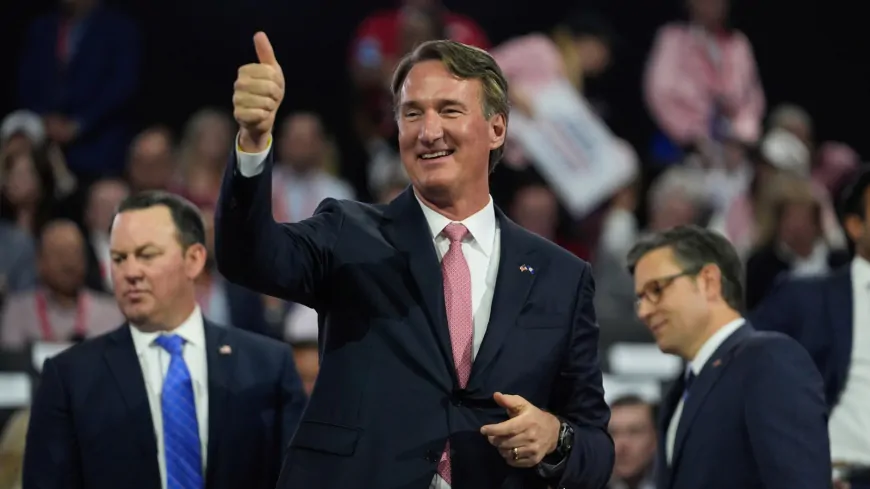Justice Department says judge can order Virginia to restore eligible voters without oral arguments in purge case

RICHMOND, Va. (WRIC) – The Justice Department believes the judge overseeing its lawsuit accusing Virginia of illegally taking people off voter rolls can rule on pausing the state program and restoring the voter status of citizens impacted without hearing oral arguments in court.
The U.S. Department of Justice’s lawsuit alleges that Republican Gov. Glenn Youngkin’s executive order in August required daily updates to voter lists that have removed people ineligible – and also those qualified -- to vote too close to the presidential election in violation of federal law.
The law, known as the National Voter Registration Act, requires all but six states to stop systematically removing the names of ineligible voters from the rolls within 90 days of the election.
Gov. Youngkin’s office says his Aug. 7 order – which came 90 days before the Nov. 5 election – doesn’t violate the law and enforces a 2006 state law signed by Virginia’s then-Democratic Gov. Tim Kaine.
With the Nov. 5 election looming, and votes already being cast in Virginia, the Justice Department wants the judge in the case to grant its motion for a preliminary injunction to halt the program and ensure eligible voters potentially impacted can cast ballots on Election Day.
The Justice Department believes the judge, who is also overseeing a similar case against Virginia filed by nonprofits, can decide based on court filings and without oral arguments.
Justice Department lawyers wrote in an Oct. 16 filing in the U.S. District Court in Alexandria that the DOJ “believes that its opposed Motion for Preliminary Injunction (ECF 9) does not require oral argument and, due to the time sensitivities, the Court may wish to proceed without oral argument.”
The Virginia Coalition for Immigrant Rights, the League of Women Voters of Virginia and other groups filed a similar lawsuit accusing Virginia of an illegal “ongoing purge” of Virginia’s voters alleging Youngkin’s order violates the National Voter Registration Act and disenfranchises eligible voters.
The groups are also seeking a preliminary injunction in its case, and the judge overseeing both says the federal court intends to consolidate them unless the parties prove why the lawsuits shouldn’t be.
The cases appear to “involve some common questions of law and fact,” U.S. District Judge Patricia Tolliver Giles, who was nominated to the court by President Joe Biden (D), wrote in an Oct. 16 order.
As of Thursday, at 4:30 p.m., no court filings have been entered on a potential consolidation of the case but there’s an Oct. 18 deadline at noon.
Lawyers in the state’s attorney general’s office filed motions to transfer both lawsuits from Alexandria to the federal court in Richmond.
“The Alexandria Division is not the Plaintiffs’ home forum, and Richmond—as the state capital—has a far greater connection to this suit,” they wrote in one filing. “Plaintiffs’ claims under the National Voter Registration Act (“NVRA”) have been filed against Virginia’s election officials and Attorney General, who are all located in Richmond.”
Judge Giles has set a hearing on the preliminary injunction motion from the nonprofits for Oct. 24 in Alexandria. The Justice Department wrote in its Oct. 16 filing that it wants to present its argument at the hearing if it takes place.
In that filing, the Justice Department wrote that Virginia’s officials believe it’s premature before the ruling on possibly transferring the case to Richmond.
Youngkin’s election security order gets Trump’s praise and Democratic criticism
Both lawsuits claim that Virginia’s program to remove ineligible voters is error-ridden because it uses data from the Department of Motor Vehicles that can be “faulty and outdated.”
Under the order, the lawsuits say the DMV sends the state’s elections department a daily list of Virginians who answered “no” to a citizenship question on paperwork or have legal presence documents indicating non-citizenship status.
The program, the lawsuits claim, has already incorrectly removed eligible voters from Virginia’s rolls and can lead to more names being stripped from the rolls.
“By cancelling voter registrations within 90 days of Election Day, Virginia places qualified voters in jeopardy of being removed from the rolls and creates the risk of confusion for the electorate," Assistant Attorney General Kristen Clarke of the Justice Department’s Civil Rights Division said in a statement after the lawsuit was filed. "Congress adopted the National Voter Registration Act’s quiet period restriction to prevent error-prone, eleventh hour efforts that all too often disenfranchise qualified voters. The right to vote is the cornerstone of our democracy and the Justice Department will continue to ensure that the rights of qualified voters are protected.”
Youngkin’s office holds up changes to Virginia’s outdated migrant labor camp rules
Youngkin’s executive order notes that local registrars notify those identified as non-citizens of their pending registration cancellation unless they confirm their citizenship within 14 days. Data from a few registrars obtained by 8News shows that eligible voters were removed from the rolls.
In a memo, Youngkin's administration called the DOJ's lawsuit "unprecedented" and defended the state's process as a requirement signed into law in 2006 by then-Gov. Kaine to remove non-citizens from voter rolls.
"The 90-day 'quiet period' under the National Voter Registration Act (NVRA) is not relevant to this process since Virginia conducts an individualized—not systematic—review per Virginia law in order to correct registration records," Richard Cullen, counselor to Youngkin, wrote in the memo.
The nonprofits filed an emergency motion for expedited discovery from the state “concerning aspects of the state’s voter removal program,” per a court filing. Arguments on the motion are set to be heard on Oct. 21 in Alexandria.
"As the matter is pending litigation, we are not in a position to comment," Shaun Kenney, director of communications for the Virginia attorney general's office, wrote in an email.

 VENN
VENN 





